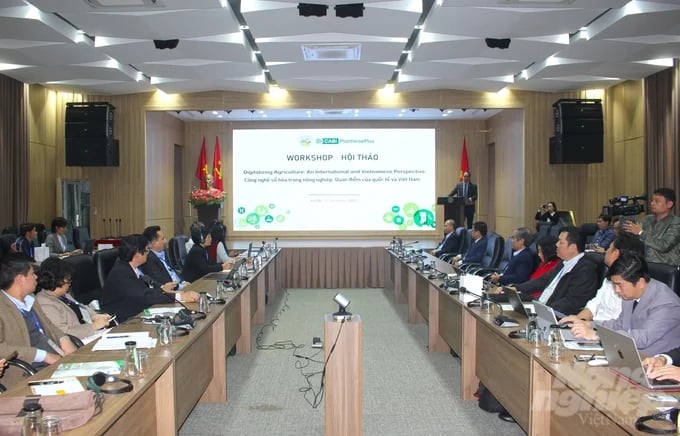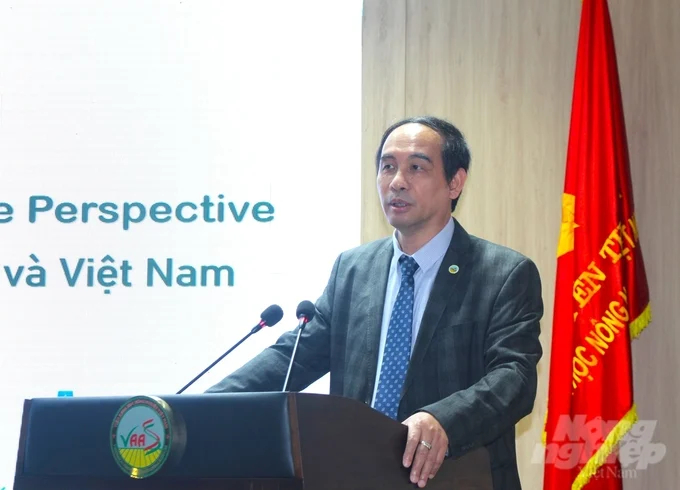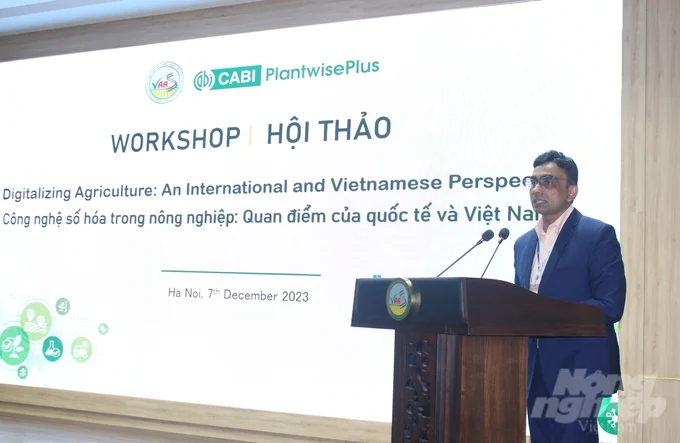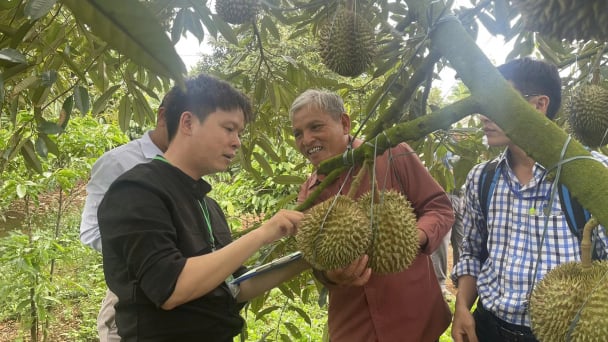June 1, 2025 | 17:44 GMT +7
June 1, 2025 | 17:44 GMT +7
Hotline: 0913.378.918
June 1, 2025 | 17:44 GMT +7
Hotline: 0913.378.918
On December 12, the "Digital Transformation in Agriculture: International and Vietnam Perspective" workshop was organized by the Vietnam Academy of Agricultural Sciences (Ministry of Agriculture and Rural Development) in collaboration with the Center for International Agricultural Biology (CABI).

The workshop drew participation from various stakeholders, including representatives from state management agencies, international organizations, businesses, and educational institutions. Photo: Trung Quan.
Dr. Dao The Anh, Deputy Director of the Vietnam Academy of Agricultural Sciences (VAAS), emphasized that the conference aimed to provide a platform for individuals interested in agriculture to share insights into the technological advancements in digital technology and the digital economy within the agricultural sector.
Addressing whether the application of digital technology in Vietnamese agricultural production is suitable and necessary, given the prevalent small-scale and dispersed production methods, Dr. Dao The Anh highlighted its potential to address significant challenges. These challenges include low labor productivity, primarily attributed to small-scale operations reliant on manual labor. This results in insufficient income that fails to incentivize the younger workforce to engage in agriculture.
Moreover, the application of digital technology in agriculture promises to enhance precision in production. This, in turn, ensures the economical and efficient utilization of inputs such as fertilizers and pesticides, as well as resources like land and water.
The digitization of information related to production techniques, markets, and agricultural products is facilitating farmers' access to accurate data, aiding them in making informed decisions.

Dr. Dao The Anh, Deputy Director of the Vietnam Academy of Agricultural Sciences, further emphasized that applying digital technology to agriculture is pivotal for overcoming major challenges faced by the sector. Photo: Trung Quan.
Simultaneously, as Vietnam strives to produce high-quality agricultural goods for both domestic consumption and export, transparency in information becomes crucial. Achieving information transparency requires producers to store data for partners and consumers to access, a need that can only be met through the application of digital technology.
Dr. Mohammad Faheem, CABI Organizing Specialist in Southeast Asia, emphasized the paramount importance of digitalization in the agricultural sector today. He stressed that for a country's agricultural industry to thrive, it must not only engage in research activities but also align with broader technological trends.
Currently, accessing critical information such as production techniques, input materials, and consumption markets remains a significant challenge for farmers, as well as agricultural extension and technical staff in the field. Moreover, those involved in trading input materials and agricultural products also require tools to provide essential information, support, and guidance to farmers. The integration of digital technology is seen as a solution to digitize information, making it more accessible and enabling individuals to make precise production decisions.
Mr. Nguyen Quoc Toan, Director of the Center for Digital Transformation and Agricultural Statistics (Ministry of Agriculture and Rural Development), assessed the current and future landscape, noting that digital transformation is evolving from theory to a tangible and powerful reality. He cautioned that without careful preparation and a proactive approach, there is a risk of falling behind in this transformative era.

Dr. Mohammad Faheem, CABI Organizing Specialist in Southeast Asia, said that access to information is still a big challenge for farmers. Photo: Trung Quan.
Additionally, Mr. Toan highlighted the present as an opportune time for Vietnam's agricultural sector to embrace digital transformation. Economic and social indicators, such as population, life expectancy, income, per capita income, and GDP growth, are all favorable. Consumers are increasingly discerning, prioritizing health, information transparency, social values, and interactive experiences. This shift promotes convenience, accuracy, and cost reduction in supply and demand. The burgeoning experience economy, marked by an emphasis on services and the digital realm, signifies a move toward a digital economy. Rural areas are predicted to be the driving force behind the next phase of the digital economy boom.
However, Mr. Toan identified critical challenges in the digital transformation process that demand attention. These include insufficient awareness and institutional frameworks for digital transformation in management and administration. Additionally, issues such as outdated and inconsistent equipment infrastructure, a lack of data sharing links in software serving directions and operations, and the absence of a structured data architecture in the agricultural sector pose obstacles. Addressing these bottlenecks is essential to pave the way for successful digital transformation, including the establishment of comprehensive databases on traceability, planting area codes, farming areas, and commodity chain data.
Translated by Quynh Chi

(VAN) 30 experts in health, agriculture and environment participated in a consultation workshop to inform the development of a methodological framework aimed at supporting Vietnam’s transition to a sustainable food system.

(VAN) Over the past five years, Quang Ninh Province has vigorously and synchronously implemented the ‘Say No to Plastic Waste’ campaign, yielding positive outcomes in advancing sustainable tourism.

(VAN) The prevention of plastic pollution necessitates collaboration among governments, businesses, and citizens. Today's little things contribute to a future free of plastic.

(VAN) This was the directive given by Deputy Minister Phung Duc Tien during a meeting with the Department of Livestock Production and Animal Health, and relevant stakeholders to prevent and control African swine fever.

(VAN) For the durian industry to succeed, the value chain must fulfill its commitments to the government, the community, and international partners.

(VAN) Vaccinating juvenile pangasius helps reduce disease, antibiotic use, and farming costs, increasing profits for export-oriented farmers in An Giang.

(VAN) Due to a limited supply of workforce and competitive recruitment requirements, businesses struggle to retain talented veterinary human resources.